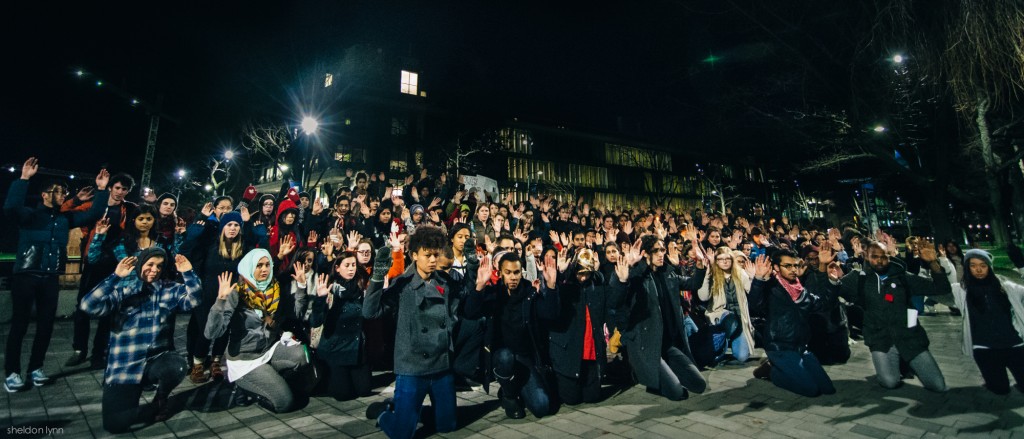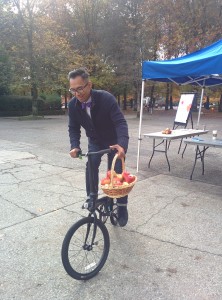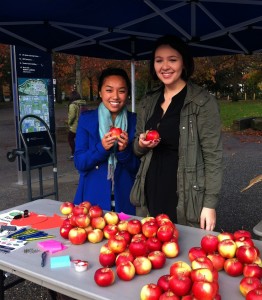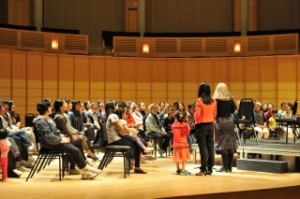Written by Blessing Falayi
On Friday, November 28 2014, one hundred candles shone in solidarity with Ferguson, Missouri, keeping vigil for murdered eighteen year old, Michael Brown. Though the vigil came into fruition just two days prior (the Facebook event only popping up on Wednesday night), the turnout was much greater than expected.
With Monday’s grand jury verdict still fresh in our minds, we came together angry, upset, saddened, and confused, but no longer silent. We wanted to do something. We wanted to show our support, we wanted to reach out, and we knew we could no longer be complicit. This is how this vigil came to be.
The main focus of this event was to honour Michael Brown, and we did so by keeping his family’s wish of four and a half minutes of silence. Candles were lit as students kept vigil by the fountain on Main Mall. These moments of silence represented the four and a half hours that Michael’s body lay on the street in the scorching summer heat. The last words of various Black men were called out to end the quietude, to remind us of the humanity of those who lost their lives at the hands of the police. To end the vigil, Ivan Leonce – the Colour Connected Against Racism Coordinator – performed “Caribbean Sun”, a poem that celebrates his Black heritage and honours the resilience of his ancestors.
At the end of the vigil, the main idea we wanted to emphasize is systemic racism. Although mainstream media continues to push themes revolving around police brutality, it is important to acknowledge there is more to the picture than these “random” acts of violence by individuals. Rather, we recognize that police brutality is the manifestation of a violent, oppressive, anti-black, and overall racist system.
Labeling the incident as a “colourblind” one would not only be a disservice to Michael Brown, but also to more Black lives that have been lost over the years. Our law enforcement reflects our society. It is far from infallible and we are still far from equity. By tiptoeing around the issue, we lose grasp of what is truly important.
Though some may claim that UBC Vancouver is a campus of relative apathy, this event is clear proof that it is not. The activist network at UBC is dedicated, strong, and admirable. We create a powerful discussion for students to come together and create change, whether it be the changing of minds or the changing of systems. UBC students are empathetic and they are only beginning to realize the extent of their power.
But why did people care about this specific event? I speculate that the reasons are endless. Perhaps it was the fact that an eighteen year old was killed. Mike was not much younger than most of us. He was unarmed and he was also Black. We understand that this is no coincidence. A no indictment verdict made absolutely no sense to us. Darren Wilson couldn’t even be brought to trial because of conflicting evidence? We’d like to ask, “Is that justice?”
We also understand that this is not an isolated incident. Sean Bell, Amadou Diallo, Tamir Rice, Kendrec McDade, Jonathan Ferrell, Trayvon Martin, Eric Garner, Aiyana Jones; these are just a few Black people who have been killed by law enforcement officers in the last fifteen years. All of them unarmed. Twelve year-old Tamir Rice was only carrying a toy gun. Did he deserve to die? Again, this is no coincidence. This is an irrevocably flawed system and UBC students know this. We understand that this same system extends into Canada. We know we are not exempt. Our indigenous population suffers heinously at the hands of this same system. This is no coincidence.
We know that we can no longer be complicit. UBC students will continue to care and we will continue the conversation. We will continue to “fight the powers that be.”







